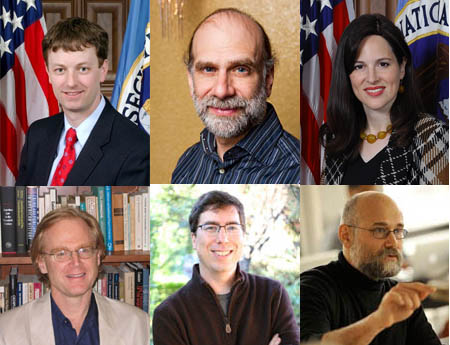Upcoming Events: Intelligence Gathering and the Unowned Internet (4/8); Ethereum: Freenet or Skynet? (4/15)
Upcoming Events / Digital Media April 2nd, 2014 |
The Berkman Center is hiring a Communications Manager. Click here to learn more about the position. We welcome you to share this announcement with friends or colleagues who may be interested. special event Intelligence Gathering and the Unowned InternetTuesday, April 8, 12:00pm ET, Harvard Law School, Wasserstein Hall, Milstein West A. Free and open to the public.  The long-term viability of an unowned, open Internet remains in question. Any analysis of where the Internet is headed as a protocol and a platform must take into account the activities of both public and private entities that see the Internet as a source of intelligence -- and a field of contention. The Berkman Center for Internet and Society is pleased to invite the community to continue the conversation on the future of the unowned Internet on April 8, 2014 with a discussion that aims to leverage perspectives from inside and outside the U.S. intelligence community to bring some clarity to a discussion often rife with confusion. Participants will include: Yochai Benkler, Berkman Professor for Entrepreneurial Legal Studies at Harvard Law School; John DeLong, Director of Compliance, National Security Agency; Anne Neuberger, Commercial Solutions Center Director, National Security Agency; Bruce Schneier, CTO of CO3 Systems and Fellow at the Berkman Center for Internet & Society; Jonathan Zittrain, Co-founder of the Berkman Center for Internet & Society; Terry Fisher, WilmerHale Professor of Intellectual Property Law at Harvard Law School and Faculty Director of the Berkman Center for Internet and Society will moderate the discussion. RSVP Required. more information on our website> berkman luncheon series Ethereum: Freenet or Skynet?Tuesday, April 15, 12:30pm ET, Berkman Center for Internet & Society, 23 Everett St, 2nd Floor. This event will be webcast live.  Ethereum is a contract validating and enforcing system based on a distributed public ledger (or blockchain) such as the one implemented by the Bitcoin cryptocurrency. Yet, Ethereum also features an internal Turing-complete scripting language that can be used to encode advanced transaction types directly into the blockchain. This allows for the deployment of self-enforcing smart contracts (such as joint savings accounts, financial exchange markets, or even trust funds) as well as distributed autonomous organizations (DAOs) that subsist independently of any moral or legal entity. These algorithmical entities are both autonomous and self-sufficient: they charge users from the services they provide so as to pay others for the resources they need (e.g. bandwidth, cpu). Thus, once they have been created and deployed onto the blockchain, they no longer need (nor heed) their creators. But if DAOs are independently operated — neither owned nor controlled by any given entity — who is actually in charge, responsible for, or accountable for their operations? And if their resources cannot be seized (because DAOs have full sovereignty over them), how can they be required to pay damages for their torts? This talk will analyse the interplay between distributed autonomous organizations and the law, with a view to explore the dangers and opportunities of Ethereum: could this new platform promote the establishment of an entirely decentralized society, or will its disruptive potential eventually be absorbed by the established system? Primavera De Filippi is a postdoctoral researcher at the CERSA / CNRS / Université Paris II (Panthéon-Assas). She is currently a research fellow at the Berkman Center for Internet & Society at Harvard University, where she is analyzing the challenges raised by distributed architectures and multimedia applications in the context of cloud computing and peer-to-peer networks. RSVP Required. more information on our website> video/audio Susan Benesch on Troll Wrastling for Beginners: Data-Driven Methods to Decrease Hatred Online Hateful and even violent speech is familiar online; what’s unusual are data-driven efforts to diminish them. Experiments so far have produced intriguing results including: some ‘trolls’ recant or apologize in response to counterspeech, and small changes in platform architecture can improve online discourse norms. In this talk Susan Benesch — founder of the Dangerous Speech Project and professor of American University’s School of International Service — discusses early research and experiments into managing and responding to hateful speech online, especially in climates where online speech may be tied to offline violence. video/audio on our website> |
Other Events of NoteLocal, national, international, and online events that may be of interest to the Berkman community:
|
You are receiving this email because you subscribed to the Berkman Center's Weekly Events Newsletter. Sign up to receive this newsletter if this email was forwarded to you. To manage your subscription preferences, please click here. Connect & get involved: Jobs, internships, and more See our events calendar if you're curious about future luncheons, discussions, lectures, and conferences not listed in this email. Our events are free and open to the public, unless otherwise noted. |
The Berkman Center for Internet & Society at Harvard University was founded to explore cyberspace, share in its study, and help pioneer its development. For more information, visit http://cyber.harvard.edu.  |